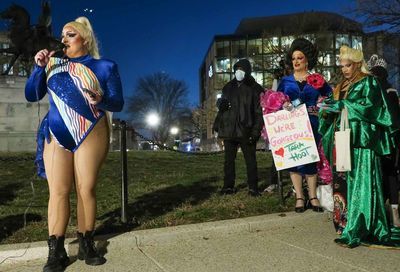Senate Judiciary Committee approves Eric Dreiband’s nomination on party-line vote
Washington-based lawyer has been nominated to head Justice Department's Civil Rights Division

The U.S. Senate Judiciary Committee approved the nomination of Eric Dreiband, a controversial Trump nominee whose nomination has rankled LGBTQ and civil rights advocates, to lead the Justice Department’s Civil Rights Division on a party-line vote of 11-9.
Dreiband’s nomination now heads to the full Senate for an up-or-down vote. He requires at least 50 votes to be confirmed — something almost assured, given Republican control of the upper chamber.
Dreiband, an attorney for Washington law firm Jones Day, has represented companies involved in labor disputes and compiled a record that liberal groups have assailed as hostile to workers. He also testified against congressional legislation that would have allowed victims of gender and age discrimination to be compensated for their injury.
LGBTQ advocates have been particularly concerned about Dreiband’s past representation of the University of North Carolina after it was sued for complying with North Carolina’s controversial HB 2 law. Under that law, transgender people were required to use only those facilities matching their assigned sex at birth, and state agencies and localities were prohibited from extending forms of nondiscrimination protections to LGBTQ people.
Dreiband has also represented nonprofit organizations seeking religious exemptions from having to provide insurance coverage for contraception under the Affordable Care Act. That worries some LGBTQ advocates because allowing such religious exemptions may open the door to employers being able to deny coverage for LGBTQ employees due to a personal animus towards homosexuals.
Civil rights groups have also flagged some answers that Dreiband gave during his confirmation hearings that they believe signal his unwillingness to enforce the nation’s civil rights laws.
For instance, as head of the Civil Rights Division, Dreiband would be tasked with enforcing the Voting Rights Act. By refusing to rule out working with President Trump’s “election integrity” commission — which is premised on the idea that Democratic voters, particularly minorities have been illegally voting and swaying U.S. elections — civil rights leaders say Dreiband may opt not to challenge state laws that aim to suppress turnout, such as those requiring overly strict voter ID requirements or attempting to “cage” voters by wrongfully removing them from the voter rolls.
When asked whether he thought it would be acceptable or appropriate for his office to coordinate with President Trump’s “election integrity” commission, Dreiband hedged, refusing to answer the question directly. He also refused to answer whether he has been in communication with people who are considered far-right political agitators and whether they may have influence over him and any decisions he may make.
In response to a question from Sen. Dianne Feinstein (D-Calif.) about the outbreak of violence in Charlottesville surrounding a white supremacist rally, Dreiband refused to say whether he agreed with President Trump that there was blame “on both sides” — a phrase meaning that liberal counter-protesters were responsible for egging on violence in the city.
“As I stated at my confirmation hearing, the events of Charlottesville were a terrible tragedy and a disgrace. I was very encouraged to see that the Attorney General immediately responded to the events in Charlottesville by announcing a civil rights investigation,” Dreiband said in response. “I echo the Attorney General’s condemnation of the actions of white supremacists in Charlottesville. As he stated, they betray our core American values and cannot be tolerated.
“As a private citizen, I do not have access to information about the specific investigation, but my understanding is that the investigation is being coordinated between the Civil Rights Division, the Federal Bureau of Investigation, and the United States Attorney’s Office. If confirmed, I would do everything I can to support the investigation and bring justice to those who are responsible.”
Civil rights advocates also expressed concern over an answer to Sen. Dick Durbin (D-Ill.) in which Dreiband refused to specifically acknowledge the threat that right-wing extremism may pose to national security, saying only that all forms of extremism ad “no place in our society” and posed a threat to the United States.
Lastly, Dreiband refused to commit to meeting with transgender individuals and their families if confirmed to head the Civil Rights Division. Responding to a question from Sen. Sheldon Whitehouse (D-R.I.) about whether he knew anyone who was transgender and whether that had influenced his views on civil rights issues pertaining to the transgender community, Dreiband again refused to provide details on the specifics of his views on transgender rights.
“I know at least one transgender person and possibly more,” he responded. “My view is that transgender Americans, like all Americans, should be treated with respect and dignity.”
Support Metro Weekly’s Journalism
These are challenging times for news organizations. And yet it’s crucial we stay active and provide vital resources and information to both our local readers and the world. So won’t you please take a moment and consider supporting Metro Weekly with a membership? For as little as $5 a month, you can help ensure Metro Weekly magazine and MetroWeekly.com remain free, viable resources as we provide the best, most diverse, culturally-resonant LGBTQ coverage in both the D.C. region and around the world. Memberships come with exclusive perks and discounts, your own personal digital delivery of each week’s magazine (and an archive), access to our Member's Lounge when it launches this fall, and exclusive members-only items like Metro Weekly Membership Mugs and Tote Bags! Check out all our membership levels here and please join us today!

























You must be logged in to post a comment.